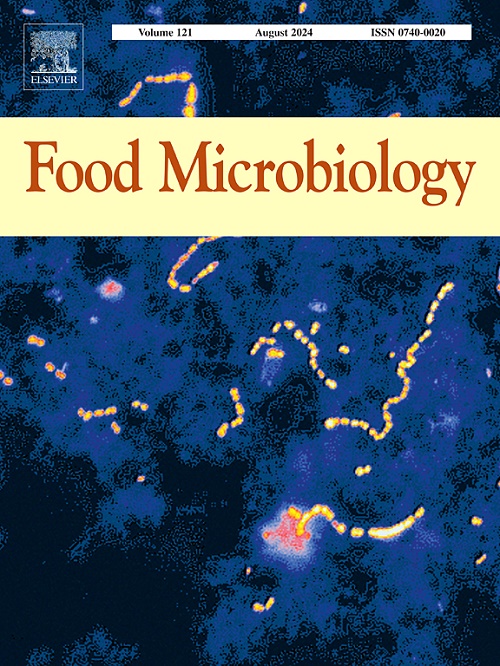Enhancing wine malolactic fermentation: Variable effect of yeast mannoproteins on Oenococcus oeni strains
IF 4.5
1区 农林科学
Q1 BIOTECHNOLOGY & APPLIED MICROBIOLOGY
引用次数: 0
Abstract
Lactic acid bacteria (LAB), principally Oenococcus oeni, play crucial roles in wine production, contributing to the transformation of L-malic acid into L-lactic acid during malolactic fermentation (MLF). This fermentation is influenced by different factors, including the initial LAB population and wine stress factors, such as nutrient availability. Yeast mannoproteins can enhance LAB survival in wine. This study explored in model conditions the impact of a commercial mannoprotein extract on MLF dynamics in ten O. oeni strains. The results revealed strain-specific responses in fermentation kinetics and mannoprotein utilization. Mannoprotein addition influenced MLF outcomes, depending on the strain and concentration. The variability in MLF confirmed different technological aptitude of the strains used. The α-mannosidase enzymatic activity was determined and showed higher values in the supernatant than in whole cells. Moreover, α-mannosidase activity varied among strains, suggesting differential regulation in response to fermentation conditions. These findings highlight the importance of understanding mannoprotein interactions with O. oeni for optimizing MLF efficiency and enhancing wine quality. Further research under cellar conditions is needed to evaluate the potential of yeast mannoproteins to promote MLF.
增强葡萄酒的苹果酸-乳酸发酵:酵母甘露蛋白对 Oenococcus oeni 菌株的不同影响。
乳酸菌(LAB),主要是酒球菌(Oenococcus oeni),在葡萄酒生产中起着至关重要的作用,在苹果酸乳酸发酵(MLF)过程中,l -苹果酸转化为l -乳酸。发酵过程受不同因素的影响,包括初始乳酸菌数量和葡萄酒应激因素,如营养利用率。酵母甘露蛋白可提高乳酸菌在葡萄酒中的存活。本研究在模型条件下探讨了商业甘露蛋白提取物对10株O. oeni菌株MLF动力学的影响。结果显示菌株在发酵动力学和甘露蛋白利用方面具有特异性反应。甘露糖蛋白的添加影响MLF的结果,取决于菌株和浓度。MLF的变异性证实了所使用菌株的不同技术倾向。α-甘露糖苷酶活性测定表明,上清液中α-甘露糖苷酶活性高于全细胞。α-甘露糖苷酶活性在不同菌株间存在差异,表明菌株对发酵条件的调节存在差异。这些发现强调了了解甘露蛋白与O. oeni相互作用对于优化MLF效率和提高葡萄酒质量的重要性。需要在地窖条件下进一步研究酵母甘露蛋白促进MLF的潜力。
本文章由计算机程序翻译,如有差异,请以英文原文为准。
求助全文
约1分钟内获得全文
求助全文
来源期刊

Food microbiology
工程技术-生物工程与应用微生物
CiteScore
11.30
自引率
3.80%
发文量
179
审稿时长
44 days
期刊介绍:
Food Microbiology publishes original research articles, short communications, review papers, letters, news items and book reviews dealing with all aspects of the microbiology of foods. The editors aim to publish manuscripts of the highest quality which are both relevant and applicable to the broad field covered by the journal. Studies must be novel, have a clear connection to food microbiology, and be of general interest to the international community of food microbiologists. The editors make every effort to ensure rapid and fair reviews, resulting in timely publication of accepted manuscripts.
 求助内容:
求助内容: 应助结果提醒方式:
应助结果提醒方式:


